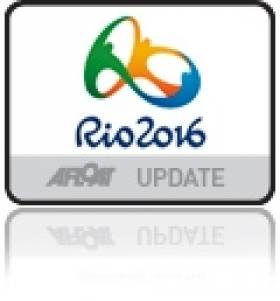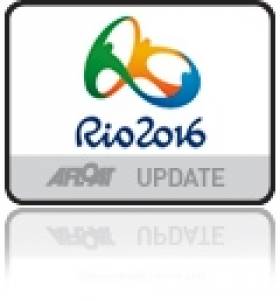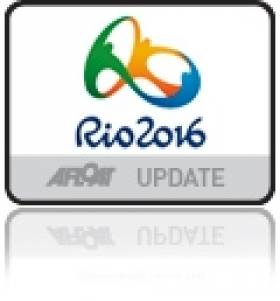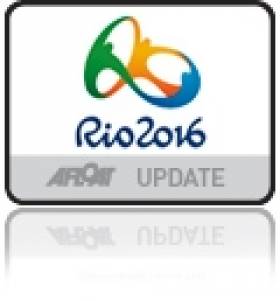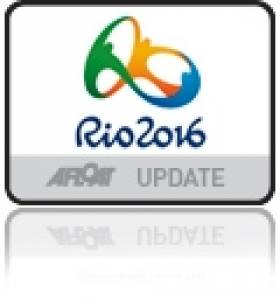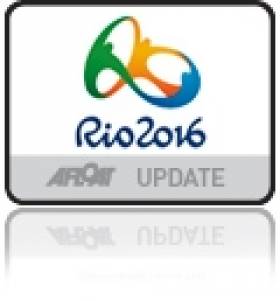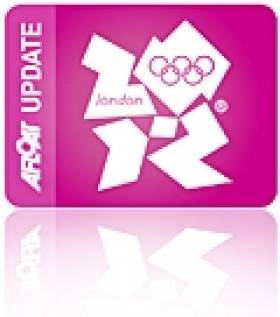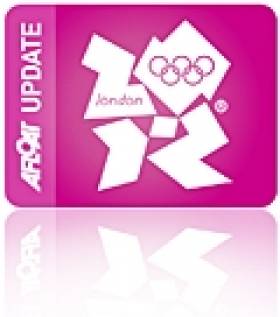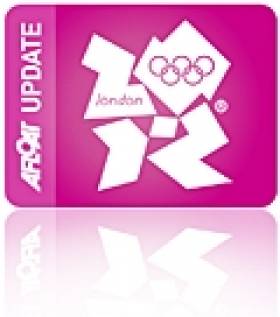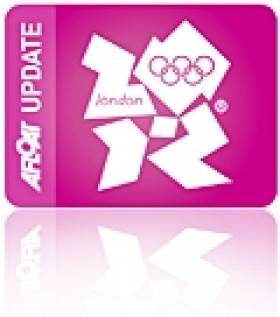Displaying items by tag: James Espey
Laser Man Espey Earns Personal Best in Oman as Scheidt Returns to the Top of World Fleet
#laser – Irish Laser London 2012 rep James Espey has taken a personal best of 31st overall at the Mens Laser worlds in Oman, an event that will be remembered for the return of Brazilian sailing legend Robert Scheidt to the top of world Laser sailing. Espey finished finished with his best race of the series in 12th to conclude his 2013 season, another step on the road to Rio 2016.
Scheidt was crowned 2013 Laser World Champion in Oman for the ninth time (and 18 years after his first victory) after winning the final race of the regatta then proclaimed this Laser World Championship title as his best so far.
The 40 year-old Brazilian sailor started the last race just one point ahead of rival Pavlos Kontides but put in a flawless performance to win by two boat lengths, raising the Brazilian flag as he crossed the line to a round of cheers and applause from spectators and other competitors.
"This feels more special than any of the other Laser Worlds I have won," said Scheidt, who returned to the Lasers after nine years in the Star class to compete at an Olympic Games in his home waters in Rio de Janeiro.
"I am at a different stage of my life – being a dad and being away from Laser sailing all these years makes it more special.
"I didn't know what to expect when I came back into the Lasers but winning the Worlds after a tough seven days means a lot.
"Rio is still a long way off and I shall have to see how my body holds up over the next few years but the next Olympic Games in Rio is definitely how I want to end my career."
Had there been no racing at Mussanah Beach, his one point lead overnight would have earned him the championship and with ten minutes to go before the 3pm cut off time, there was no sign of any racing due to the light and shifty breeze.
But at 2.56pm the start gun was fired and Scheidt, Kontides and third-placed Tonci Stipanovic from Croatia all made good starts
"I had a good start which was key," he explained
"Started in the middle and played the first shifts well which put me in the leading group at the top mark. I managed to get ahead and protected my position. It was a tense race because the breeze was very flukey going right and left and the race committee did well to wait for the breeze to stabilize. The moment we started we had the best breeze we'd had all day but it was still very shifty."
Kontides finished the race in 13th place to take the silver medal, trailing Scheidt by 13 points and while paying tribute to the Brazilian said he felt the odds were against him continuing to dominate in the way he had in Oman.
"He sailed a perfect race so well done to him," said the 23 year-old Cypriot who was completing his studies in Ship Science at the same time as preparing for the Worlds.
"But with some consistent training, I will be able to up my game and I know next season I will be much better. I am still learning and developing and Robert is at the peak of his game. Age wise he is 40 and at some stage will start to decline whereas I am 23 and on the up so the odds are against him.
"I decided the conditions were too tricky for any tactics – we have seen all week how the conditions demand proper sailing and a respect for the oscillating shifts so I thought the best thing to do was to do my best.
"I really wanted to taste the gold medal but I will be trying my hardest again next time."
Germany's Phillip Buhl won the bronze medal after finishing 10th in the final race which put him level on points with Rutger Schaardenburg from the Nederlands. Better results over the week gave him the advantage but it was bouncing back from being BFD in the final race on Friday that gave him most pleasure.
"I had a bad day on Friday so I'm very surprised to finish third," he said.
"I am not the best light winds sailor or at least I wasn't but I've improved and I am better now in all conditions. Having Robert Scheidt back in the fleet is good fun – beating him is more fun than beating anyone else and we can learn a lot from him. He really deserved to win here."
The prize-giving at the Al Mussanah Sports City where Scheidt, Kontides and Buhl were all presented with their medals, brought the curtain down on a tough but highly successful Laser World Championships, the first sailing championships to be hosted in Oman.
Laser Sailor Espey in Top Third at Laser Worlds, Oman
#laser – Ireland's James Espey lies 32nd in a fleet of 126 after two races of the Laser Standard World Championships in Oman.
British sailor Nick Thompson has never won a major Laser event but today he revelled in the superb breeze at Mussanah, Oman to get his 2013 Laser Standard World Championships off to a promising start after the opening two races.
Thompson, who missed last year's world championships when he fell ill with appendicitis, followed up his second in the first race of the day with victory in the second to head the leaderboard overnight with three points, ahead of Sweden's Jesper Stalhein (5) and Pavlos Kontides of Cyprus (8).
The conditions, comprising brilliant sunshine with winds that topped out at around 16 knots and seas that started flat but grew choppy two hours into racing, were described by officials on the race boat as perfect and ideal for sailing.
This was a description that eight times Laser World Champion Robert Scheidt agreed with after posting a fourth and fifth to sit in seventh place overnight.
The qualifying races continue on Monday with two scheduled for each day until Wednesday. The finals series starts on Thursday with the last two showdowns set for Saturday.
Top ten after two races:
1. Nick Thompson, GBR, 3.0 points
2. Jesper Stalhein, SWE, 5.0
3. Pavlos Kontides, CYP, 7.0
4. Tom Burton, AUS, 9.0
5. Tonci Stipanovic, CRO, 9.0
6. Jean-baptiste Bernaz, FRA, 9.0
7. Robert Scheidt, BRA, 9.0
8. Bruno Fontes, BRA, 11.0
9. Francesco Marrai, ITA, 12.0
10. Andrew Maloney, NZL, 14.0
Full results here
James Espey's Oman Odyssey Wraps 2013 Olympic Laser Season
#laser – This weekend Northern Irish Olympic sailor James Espey will take on some of the legends of sailing at the Men's Laser World Championship in Muscat, Oman. Brazilian sailing legend Robert Scheidt, who has won five medals at consecutive Olympic Games has returned to the Laser class after nine years in the Star class raising the stakes among the Rio 2016 contenders at this coming championship which will begin on Sunday the 17th of November. Also competing will be Australian national champion Tom Burton who has been number one in the Laser world rankings for over a year.
The 39th edition of the Laser World Championships is one of the largest dinghy sailing events and the first sailing world championships ever held in the Sultanate of Oman.
Over the course of the seven day regatta, Al Mussanah Sports City will host 128 of the world's top Laser Standard sailors from 50 countries across Africa, Asia, Europe, Oceania, North, South and Central America. Espey, who hails from Bangor, Co Down, will sail two races each day for the seven days. Also representing Ireland and joining his fellow Ballyholme club mate is Colin Leonard who is taking a break from his university studies to compete at the event.
No Medal Race Finish for Irish Laser Sailors at ISAF World Cup
#isaf – The medals were decided across the ten Olympic events as ISAF Sailing World Cup Hyères brought the 2012-13 World Cup series to a close but there was no place for either of Ireland's London Olympic sailors who did not make the medal race finals.
Annalise Murphy's poor start to the event ultimately cost her the chance of competing in the final medal races. Another casualty was Chinese Olympic gold medallist Xu Lija whose slow start was also her downfall. Neither girl will be too worried as both the World Championships and Europeans are still to come later in the summer.
However, Irish Sailing Association management admit 'a lot of work needs to be put in between now and then for Murphy to turn her fortunes around'.
In the end Murphy was in impressive form in the Silver fleet, as would be expected, and finished the regatta in 29th overall.
Meanwhile in the 113 boat Laser fleet, Northern Ireland's James Espey got off to an incredible start. Winning the first race, Espey was tied for second place after three races on Day 1. The solid start gave him the platform needed to qualify for the Gold fleet. He showed glimpses of his potential in gold but lacked the consistency to maintain a high overall placing. Nevertheless, he will take confidence from this performance and it sets him up well for a busy summer schedule. Overall he finished a respectable 34th.
An up and down breeze that never truly filled in at any point ensured for close knit racing on the final day in the south of France.
Although Alex Maloney and Molly Meech (NZL) brought an 18 point 49erFX lead into the final day there was no room for complacency as three double point Medal Races could have brought dramatic changes.
Keeping out of trouble they posted a steady 5-4-5 to take their second ISAF Sailing World Cup regatta win of the 2012-13 season. "We're happy that we've won our first World Cup event in Europe," said Maloney, who with Meech won the inaugural 49erFX event at ISAF Sailing World Cup Melbourne. "It was quite stressful out there with it being so light and shifty and the lead changed all the time."
There is room for optimism with the girls, however they know the road to Rio will take time, "It's just beginning," said Meech. "Most of the girls are quite new to the boat so there's a long way to go and it's going to keep getting harder."
Charlotte Dobson and Mary Rook (GBR) take silver and Dutch team Annemiek Bekkering and Claire Blom had a great day to take the final podium spot.
Great Britain's Dylan Fletcher and Alain Sign got the job done the 49er with a 2-1-3 score line. Having come into the day with a joint lead Fletcher and Sign couldn't have asked for much more in tricky conditions. David Evans and Ed Powys made it a British top two and Carlos and Anton Paz (ESP) rounded off the top three.
Marit Bouwmeester (NED) christened her return back in the Laser Radial after London 2012 with a well-deserved gold medal. Leading the first Medal Race from start to finish Bouwmeester established a seven point advantage over Tuula Tenkanen (FIN) and Alison Young (GBR) who were tied for silver.
"I just had to focus on myself and sail a good race," said the Dutch sailor. "When it is light and tricky it's a bit easier because you can only focus on yourself and I won the first race and made it a bit easy. The other two girls started racing each other in the second race so it was easy for me," she said with a smile.
"I didn't really have it as a goal to win a medal. I had a big break and came out here to see how it goes and it went a lot better than I expected," Bouwmeester added.
At the start of the final Laser Radial Medal Race Tenkanen found herself ahead of Young and made sure she kept her at bay, "I didn't get a very good start on upwind but I climbed a bit on the first downwind and chose the better gate mark," said Tenkanen. "I was before Alison and because Marit was so far in front I decided to ensure Alison stayed behind so the rest of the race I tried to cover her."
Finishing in ninth and tenth place Tenkanen and Young could not be caught so Young, who won gold at ISAF Sailing World Cup Palma took bronze.
Tom Burton (AUS) put his ISAF Sailing World Cup Palma woes behind him in Hyères to claim a hard earned gold medal. Burton lost a commanding lead in Palma but chipped away at Tonci Stipanovic's (CRO) advantage to come from behind and take Laser gold. Stipanovic (CRO) fell to third whilst Robert Scheidt (BRA) tastes silver on his Laser return.
"I was always coming from behind here whereas in Palma I was always in the front," said Burton. "It doesn't make up for it but it's good to learn from my experience and improve on it this."
Burton has been ranked World #1 in the Laser since December 2012 but doesn't see himself as the guy to beat, "Everyone is so good if you don't sail well it doesn't matter what your ranking is you're going to get chopped. It's good to be World #1 and at the front as well."
Daniel Mihelic (CRO) had a superb day on the water taking both race wins but being too far behind to take a medal he ended up fourth overall.
Charline Picon (FRA) lost a substantial Women's RS:X lead after she was OCS in the first Medal Race. This put Bryony Shaw (GBR) and Blanca Manchon (ESP) in the driving seat going into the second Medal Race making it winner takes all.
Ahead of racing on the final day Shaw said, "I'm really happy to be windsurfing. I had a good World Championship finished second and I want to keep the momentum going from that. That's why I'm happy to be here and doing all the World Cups."
Shaw has been prevalent on the World Cup circuit with a fourth in Miami and a second in Palma to move to World #3 and showed she is one of the best at the moment by taking the final race win in Hyères to seal gold.
Manchon finished third to take silver whilst a seventh for Picon meant she won bronze.
Przemyslaw Miarczynski (POL) came back into the Men's RS:X with a bang and notched up double bullets to claim gold. Compatriot Piotr Myszka came through in silver medal position and Julien Bontemps (FRA) concluded the podium.
"It was pretty hard and I've not trained a lot in the light conditions," said Miarczynski, London 2012 bronze medallist, "I didn't expect to be so good in the light winds but preparing a lot in the winter time was helpful here."
Poland boasts a strong RS:X contingent personified by them taking the top two spots in Hyères and Miarczynski is reaping the rewards, "This is very good because we train together and it's really helpful. We also have Pawel Tarnowski and he's also very good and we're three competing against each other so it's very nice."
Andrew Mills (GBR) overcame Giles Scott (GBR) in the Finn to take gold. Going into the last race the pair had secured the top two spots so it was winner takes all. "We both needed to get a result in to secure silver at least in the first race and then the last race was just a match race between the two of us. It was whoever did the best would win," Mills said.
Coming in third Mills was ahead of Scott who finished at the back of the pack and Mills was pleased to overcome his countryman, "Giles is hard to beat at any point so to beat him and put myself up there is great."
New Zealand's Josh Junior had a great week and sailed himself to the bronze knocking Pieter-Jan Postma (NED) out of the medals.
Brazil's Fernanda Oliveira and Ana Barbachan (BRA) turned their overnight Women's 470 lead into another ISAF Sailing World Cup gold medal making it three in a row after Miami and Palma wins. "It was so difficult today," said Oliveira. "We didn't do good races and our starts were so bad. We are happy with the result and it's good to win again. We're going to have some days of rest, relaxing at home and then we'll start training again."
Camille Lecointre and Mathilde Geron (FRA) took the silver medal and Great Britain's Sophie Weguelin and Eilidh McIntyre took their second consecutive World Cup podium spot in third.
Double bullets on the last day for Mat Belcher and Will Ryan (AUS) secured them their fourth gold medal together since teaming up. For Belcher his unbeaten Men's 470 run, that stems from November 2011, continues, "To come into these events having won them last year and with a new partnership there's high expectations," said Belcher. "To come away with another win with today's condition and finish off by winning both Medal Races was fantastic."
Ryan added, "There's been a full range of conditions and a lot of the top sailors have really come through. Everybody has had a few bad races along the way and I think every fleet saw really close racing so it's been a really great event."
Sofian Bouvet and Jeremie Mion (FRA) maintained their spot in second place and London 2012 Olympic bronze medallists Lucas Calabrese and Juan de la Fuente (ARG) complete the top three.
Anything was possible on the final day in the Nacra 17 as just five points divided the top five.
The fleet were delayed due to fickle breeze and testing conditions that were prevalent on the course. Once racing got underway it was Sweden's Tim Shuwalow and Hanna Klinga (SWE) who prevailed. They ended up tied on 59-points with Billy Besson and Marie Riou (FRA) but based on the combined score of the Medal Races the Swedes took gold to win on count back.
Matias Buhler and Nathalie Brugger complete the podium.
Regattas in Melbourne, Miami, Palma and Hyères have made up the 2012-13 ISAF Sailing World Cup circuit with some great racing seen along the way.
With a busy summer of World Championships for the ten Olympic events attentions will turn back to World Cup duties starting at Qingdao, China in October 2013.
Espey Ends Olympic Palma Regatta in 38th Place
#olympicsailing – Ireland's sole interest in Palma de Mallorca, James Espey has finished 38th overall, the third event in the ISAF Sailing World Cup circuit. The Belfast sailor scored a 26th in the final race in the gold fleet on Saturday, his best result of the tricky series.
A fantastic week of sailing has come to a close in Palma. The 44th Trofeo Princesa Sofia Mapfre delivered great racing conditions and a real test coming into the new Olympic quadrennial.
It was interesting to test here a new scoring system and format, and despite mixed opinions, the regatta has deserving winners in all classes and most of the regatta leaders conserved their yellow jersey after their medal races.
Denmark's Ida Marie Baad Nielsen and Marie Thusgaard had an incredible finish and took three wins out of four Medal Races in the 49erFX.
"We tried to be very relaxed and focussed going into the Medal Races," said the excitable duo. "Our main decision was to decide whether to go right or left after the start to find a position where we could be alone and able to make our moves freely. It was great fun with this stadium format to have so many tacks and gybes! It was tiring too because we needed to concentrate and anticipate our next move."
The Danes have dominated for most of the week and have shown they are the top sailors in the developing 49erFX fleet. Their skiff experience over the years together is proving to be the right recipe for success.
After a fantastic week to add the cherry on top of the cake, the pair will be awarded the Absolute Winner trophy which recognises the sailors with the best average score over the regatta. This trophy was won last year by 2.4mR sailor Thierry Schmitter (NED).
Alexandra Maloney and Molly Meech (NZL), never too far behind the Danes, took the last race win to place second. Jena Mai Hansen and Katja Salskov-Iversen (DEN) complete the podium.
Germany's Erik Heil and Thomas Ploessel secured their first major regatta victory in the 49er having picked up their game throughout the week. "We had an average qualification stage and got into the finals in eighth position," they said. "Our first final day was great with three wins. Today we had another win and top three results only in the four Medal Races. We have great speed and enjoy the breeze, so this was a week for us."
The pair will be following the World Cup circuit in a bid to move up the rankings, "Our objective this year is to be in the World top five. We will be doing a maximum of 200 points regattas like Hyères and the Worlds but also some of the Eurosaf circuit."
Andy Maloney (NZL) nailed the Laser Medal Races and took two race wins to overturn a huge deficit over Australia's Tom Burton (AUS) who despite a steady first race had a disaster in the second, "I was set up pretty well for the last one so I could only get beaten by one guy," said Burton. "I ended up getting an OCS and he beat me. So a few tough lessons and probably something I won't do again but these things happen."
Maloney was able to capitalise on Burton's mistake and was delighted with the way it went, "It was a really good day. With the new system there were a lot of points up for grabs and it went pretty well to get two wins and I couldn't ask for much more. It feels pretty good to come from equal third to win the event. It was a bit unfortunate for Tom Burton in the last race but that happens to all of us."
New Zealand's Sam Meech rounded off the Laser podium.
In the Laser Radial Alison Young (GBR) secured a deserved gold medal having dominated the fleet all week long.
"I am really pleased to have won. I have learnt lots of lessons from this regatta and I am looking forward to the rest of the season. Going into the final medal race, only the Danish could beat me so I had to make sure of the result."
A second in the first Medal Race gave her a handsome advantage and she kept Sarah Gunni (DEN) at bay on the last race with the Dane settling for silver. Anne-Marie Rindom (DEN) won the Medal Race to pick up bronze.
Flavia Tartaglini (ITA) stepped it up in the Women's RS:X on the final day and was first past the post in both Medal Races. The World #1 was all smiles on shore after racing, "I'm super happy," she said. "I just had a perfect day. I was coming into the day in fourth so a pretty good position. I was not that close to the first but with two Medal Races everything is possible so I tried to do two good races to finish the competition and it paid off."
Her two race wins knocked overnight leader Bryony Shaw (GBR) down into second and Germany's Moana Delle into third.
ISAF Sailing World Cup Miami Men's RS:X champion Ivan Pastor (ESP) made it two World Cup gold's in a row after two fourths in the Medal Races. The Spaniard led coming into the final day and held on to top spot. Toni Wilhelm (GER) and Kiran Badloe (NED) took the race wins and subsequently moved up to the podium places.
Giles Scott (GBR) took gold in the Finn. Pieter-Jan Postma (NED) threatened the Brits dominance when he closed the gap to one point after the first Medal Race. However, Scott made sure from the start he would leave the Dutch in his trail. "PJ and I match-raced at the start of the second race," explained Scott. "I finally succeeded in forcing him in an uncomfortable position and took a safe advance over him." On the new format Scott added, "It did work out all right for me but I don't really like it as I prefer consistency over the week and the varied conditions to be recognised in the results."
Postma (NED) ended up second with Vasilij Zbogar (SLO) in third. London Bronze medallist Jonathan Lobert (FRA) missed out on the podium in fourth.
Fernanda Oliveira and Ana Barbachan (BRA) came fifth in the days first Medal Race in the Women's 470 and finished with a bang in the last, taking the race win and the gold medal. "We are very happy," exclaimed Barbachan. "We didn't expect to win like this. We thought it would be a hardest race but these conditions seemed to be nice for us."
Sophie Weguelin and Eilidh Mcintyre (GBR) finish second with the American pair of Anne Haeger and Briana Provancha (USA) third.
With shifty conditions only one Men's 470 Medal Race could be completed on the final day and a fourth from Mat Belcher and Will Ryan (AUS) ensured they maintained their unbeaten life in the Men's 470. Belcher is the only sailor this week to keep his title won last year with Malcolm Page. Greece's Panagiotis Mantis and Pavlos Kagialis place second and Luke Patience and Joe Glanfield (GBR) third.
Despite a mid-race mishap on the final day Mandy Mulder and Thijs Visser (NED) took gold over their team mates Renee Groenenveld and Karel Begemann in the Nacra 17. "We had some issues during the races and in the first one we capsized," explained Mulder. "One boat nose-dived just in front of us and we had starboard and I was like 'uh oh we're going to hit the boat' so I went inside very quickly and then I went swimming behind the boat and it capsized. We were top three but got upright really quick and ended up sixth."
Moana Vaireaux and Manon Audinet complete the Nacra 17 podium.
"We are happy about our speed. We made some tactical errors today on the last race, but in definite, I am happy to be able to prove myself on the Olympic circuit" said Moana Vairaux.
Sailors focus now turns to ISAF Sailing World Cup Hyeres in the South of France. Ireland's Annalise Murphy returns to the circuit and racing gets going on 22 April through to 27.
Espey Makes Laser Gold Fleet for Palma Finals Today
#olympicsailing – It's been tricky sailing in Palma for Ireland's sole entry in the second round of ISAF's World Cup series this week.
At least Belfast Lough single-hander James Espey has made it into the gold fleet of the men's single-handed Laser class this morning.
The 44th Trofeo Princesa Sofia Mapfre, ISAF Sailing World Cup Palma regatta, saw the conclusion of the qualification series after three days of fantastic racing in varied conditions in the bay of Palma.
With many new faces on the scene, the class favourites have made sure they show their full potential in the first ISAF Sailing World Cup regatta on the European circuit in front of new rivals.
The Nacra 17 fleet raced in the afternoon with a medium breeze and small waves, it was a perfect day with great conditions and after six races countries with a strong multihull culture such as the Netherlands and France are on top.
For 49erFX sailors Ida Marie Baad Nielsen and Marie Thusgaard Olsen (DEN) and Alexandra Maloney with Molly Meech (NZL) training in New Zealand over the winter proved successful as they lead the fleet. Only a point separates both teams who have shared their progression in the 49erFX and they hold a clear advantage over the fleet with 20 points separating them and the Italians Giulia Conti and Francesca Clapcich in third place.
The Finn sailors were the first off the water, concluding their qualification series after six races. After fighting for top place with Jonathan Lobert (FRA), Giles Scott (GBR) has shown regularity on all conditions to take the lead in the 72 boat fleet. The 2011 European and World Champion is one point ahead of Vasilij Zbogar (SLO) and two points ahead from team mate Andrew Mills (GBR).
Philip Buhl (GER) has kept the lead in the Laser, distancing World #1 Tom Burton (AUS), now placed in fourth. Andy Maloney (NZL) has jump to second overall after taking two bullets in the last qualification races.
The Finals will start today for all classes with the exception of the 2.4mR who see tonight a new leader with Sailing World Cup Miami winner Megan Pascoe (GBR) who has not finished anywhere worse than second in a fleet of 23 boats.
Northern Ireland Laser Sailor Books Olympic Berth
#OLYMPIC SAILING – Belfast Lough is sending a second boat to the Olympic regatta in July following James Espey's Olympic qualification result in Germany today.
After four days of racing at the Laser World Championships in Germany, Espey from Ballyholme Yacht Club achieved Olympic qualification when he made the Gold fleet in Day four of the event.
Light winds were again prevailing today on day four of the Laser Standard Worlds at the Baltic Sea. In abating winds, two races were sailed, and Tom Slingsby AUS extended his lead with another race win to 9 points.
Espey scored 7, (29), 3, 20, 18, 17 ,22,19 to make the gold fleet. He now lies in 30th position overall and is second from nations who have not already qualified. By virtue of the fact there are only 6 unqualified nations in Gold fleet and there are 12 places on offer at this event Espey can be satisfied with a job well done.
Espey is the fourth Irish sailing campaign to qualify for Ireland. The other three teams Annalise Murphy (Laser Radial), Peter O'Leary and David Burrows (Star) and Belfast club mates Ryan Seaton & Matt McGovern (49er) qualified at the World Championships in Perth, Australia in December 2011.
A further two campaigns, Gerbil Owens and Scot Flanigan (470) and Ross Hamilton in the Finn dinghy are also targeting Olympic qualification this month.
Espey Plans Belfast Olympic Fundraiser
#OLYMPIC – Ballyholme and Royal Ulster Yacht Club sailor, James Espey has been campaigning to go to the Olympics in Weymouth this summer. As part of his campaign he is hosting a Fundraising Day on Saturday 18 February at BYC. This will include a day of coaching and racing, then and an evening party. The coaching will be taken by James himself and a guest coach. Top Laser sailors will be racing – come along and pace yourself against the best Laser sailors in the Northern Ireland.
In the evening there is a great party planned – Dinner and Cocktails, an Olympic auction and entertainment with music. Come along to support 'Bapsy' and send him on his Olympic journey.
James will be competing in Germany at the Laser Worlds and this is the event he is anticipating to qualify for the Games.
Saturday, 18 February
Laser Coaching 1130-1300hrs
Lunch 1300-1400 (Soup & Rolls)
Laser Racing 1400 – 3 races
Dinner & Cocktails 1900hrs
Auction @ 2030
Tickets for the full day are £30, £15 for the evening dinner and entertainment
Irish Sailors Fight for Medal Race Rights in Miami
#MOCR – A place in this weekend's medal race is the likley prize for Olympic Star keelboat pair Peter O'Leary and David Burrows who have scored top ten results for the third day in a row at the Miami Olympic Classes Regatta. The Cork–Dublin duo, now in seventh overall after a seventh and a sixth scored yesterday, need to continue the consistent performance into today's final round of fleet racing to secure a top ten placing overall.
Dun Laoghaire's single-hander Annalise Murphy in the Laser Radial now in ninth overall is also set for a place in Saturday's medal race having discarded her worst result of 27th, scored yesterday afternoon on Biscayne Bay.
The Irish Paralympic team in the Sonar class had their best day so far of the championship with two fifth places. A protest yesterday evening resulted in their disqualifcation from yesterday's final race but that didn't prevent them from moving up one place on the leader board to seventh overall.
Laser sailor James Espey from Belfast Lough slipped to 22nd overall following two 35th places.
Additional reporting by organisers:
Miami, Florida, USA: A final showdown awaits three Paralympic classes tomorrow and ten Olympic classes on Saturday at US Sailing's Rolex Miami OCR, which has, thus far, gifted sailors with four days of sublime sunshine and satisfying winds. The event is the only one of seven ISAF Sailing World Cup events to grace a shore on this continent and has attracted 529 sailors from 41 countries from as close as Canada and as far away as New Zealand and China.
"It's looking pretty exciting," said Brazil's Star sailor Robert Scheidt, who with crew Bruno Prada has perhaps one of the most impressive sailing records here. (Together, they are two-time Olympic medalists and just off their second straight title win at the Star World Championships). "Some of the guys who have already got a spot in the Olympics are here and they are really sailing well."
No one has been proving that theory better than Sweden's Fredrik Loof/Max Salminen who yesterday trailed Scheidt/Prada by two points and today tied on points with the Brazilians after finishing 6-2 to their 3-7. With both teams posting 26 points, Norway's Eivind Melleby/ Petter Moerland Pedersen are nipping at their heels with only 29 points.
As will happen at the Olympics, only the top-ten boats after tomorrow's racing will be allowed to progress to Saturday's single medal race, which will determine gold, silver and bronze medals.
For the Paralympic sailors here, tomorrow will be the final day of racing (two races each scheduled for Skud-18, Sonar and 2.4mR classes) and determine who takes home medals. (This is the same format that will be followed at their Games.)
Top three podium positions:
Sonar, 10 boats, - 8 races
1. Jourden Bruno / Vimont Vicary Nicolas / Flageul Eric, FRA, 19 points
2. Udo Hessels / Marcel van de Veen / Mischa Rossen, NED, 20
2. John Robertson / Hannah Stodel / Steve Thomas, GBR, 22
Star, 29 boats, - 8 races
1. Robert Scheidt / Bruno Prada, BRA, 26
2. Fredrik Loof / Max Salminen, SWE, 26
3. Eivind Melleby / Petter Moerland Pedersen, NOR, 29
49er, 23 boats, - 12 races
1. Nico Luca Marc Delle Karth / Nikolaus Resch, AUT, 29
2. Erik Storck / Trevor Moore, USA, 33
3. Allan Norregaard / Peter Lang, DEN, 61
Skud-18, 6 boats, - 8 races
1. Daniel Fitzgibbon / Liesl Tesch, AUS, 13
2. Alexandra Rickham / Niki Birrell, GBR, 13
3. Jennifer French / Jean-Paul Creignou, USA, 20
2.4mR, 25 boats, - 8 races
1. Damien Seguin, FRA, 13
2. Paul Tingley, CAN, 33
3. Megan Pascoe, GBR, 39
Laser Radial, 60 boats, - 8 races
1. Lijia Xu, CHN, 19
2. Marit Bouwmeester, NED, 25
3. Evi Van Acker, BEL, 38
470 Men, 22 boats, - 8 races
1. Mathew Belcher / Malcolm Page, AUS, 20
2. Sven Coster / Kalle Coster, NED, 24
3. Lucas Calabrese / Juan Maria de la Fuente, ARG, 32
470 Women, 15 boats, - 8 races
1. Lisa Westerhof / Lobke Berkhout, NED, 22
2. Hannah Mills / Saskia Clark, GBR, 23
3. Maria Fernanda Sesto / Consuelo Monsegur, ARG, 31
Laser, Gold,, 37 boats,- 8 races
1. Paul Goodison, GBR, 15
2. David Wright, CAN, 17
3. Bruno Fontes, BRA, 18
Laser, Silver,, 37 boats,- 8 races
1. Marcin Rudawski, POL, 100
2. Ricardo Montemayor, MEX, 103
3. Matthew Ryder, CAN, 114
Finn, 25 boats, - 8 races
1. Zach Railey, USA, 9
2. Jonas Hogh Christensen, DEN, 19
3. Brendan Casey, AUS, 25
RS: X Men, 14 boats, - 8 races
1. Nick Dempsey, GBR, 7
2. Elliot Carney, GBR, 19
3. Mariano Reutemann, ARG, 20
RS: X Women, 12 boats, - 6 races
1. Demita Vega De Lille, MEX, 10
2. Carolina Mendelblatt, POR, 21
3. Farrah Hall, Annapolis, Md., USA, 22
Women's Match Racing
TOP FOUR ADVANCING TO SEMIFINALS
Sally Barkow / Alana O'Reilly / Elizabeth Kratzig-Burnham, USA, 3 wins- 0 losses
Silja Lehtinen / Silja Kanerva / Mikaela Wulff, FIN, 3 wins- 0 losses
Olivia Price / Nina Curtis / Lucinda Whitty, AUS, 3 wins- 0 losses
Lucy Macgregor / Annie Lush / Kate Macgregor, GBR, 3 wins- 2 losses
Black Flag Rules Out Espey's Perth Qualification Hope
#PERTH2011 – A black flag result for Ireland's Laser sailor James Espey ruled out any chance of Olympic qualification in Perth today even though the Belfast single-hander was on the cusp of qualifying going in to today's final rounds.
He finished 38th nation with only the top 35 nations going through to London 2012. He has a further chance at the Laser World Championships in Germany but that is not until May.



























